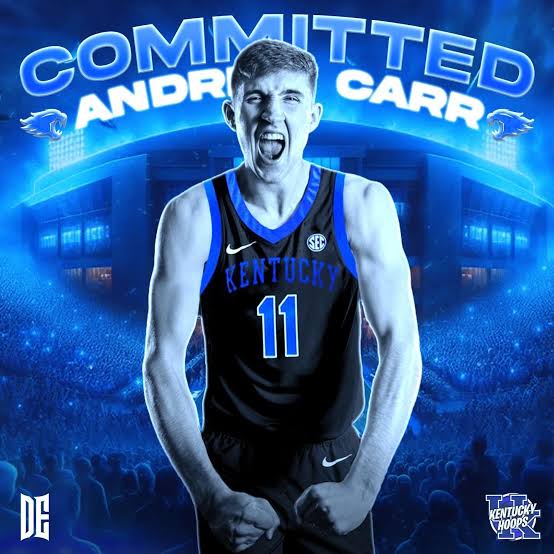
In a sport where tradition and loyalty often take center stage, Andrew Carr’s move to Kentucky following a crucial three-hour drive has sparked both excitement and controversy in the college basketball world. This unexpected transfer has left many fans and analysts questioning not only the young forward’s decision but also the shifting dynamics within the NCAA.
The Three-Hour Drive That Changed Everything
For Andrew Carr, a rising star who previously made waves with his performances at Wake Forest, the decision to switch to Kentucky came after a pivotal three-hour journey to the campus in Lexington. This seemingly simple drive has since become a focal point in discussions surrounding player transfers, with many suggesting it could signify a broader trend of athletes prioritizing immediate exposure over long-term loyalty.
Carr’s reasons for the switch remain mostly private, but sources close to the player suggest that the allure of joining one of college basketball’s most iconic programs, coupled with the promise of better development under Kentucky’s coaching staff, played a key role. The move, however, raises deeper questions about how modern players view their careers and the implications for smaller programs.
Kentucky: The Mecca of College Basketball
Kentucky Wildcats basketball needs no introduction. The program, renowned for producing NBA-level talent, is one of the most prestigious in the country. For Carr, the opportunity to don the blue and white represents more than just a chance to elevate his game. It’s a platform to showcase his talents on a national stage with millions of eyes watching.
But this is where the controversy kicks in. Critics argue that Carr’s transfer is emblematic of a larger issue in college sports: the exploitation of the transfer portal by power programs. Kentucky, along with other basketball powerhouses, has been accused of poaching talent from smaller schools, luring players with promises of fame, fortune, and professional prospects.
A Detriment to Mid-Major Programs?
For programs like Wake Forest, where Carr initially developed his game, the transfer could be seen as a blow. Smaller programs often rely on developing young talent over multiple seasons to compete with the blue bloods of college basketball. But when players like Carr jump ship for a larger platform, it leaves mid-major programs struggling to maintain competitiveness.
This dynamic leads to a troubling question: Is the current system unfairly skewed in favor of powerhouse programs? Critics argue that the NCAA’s transfer rules, particularly with the rise of NIL (Name, Image, and Likeness) deals, disproportionately benefit programs like Kentucky, which can offer players more lucrative opportunities than smaller schools. For every player like Carr who makes the leap, countless smaller programs are left to rebuild from the ground up, unable to compete in this new era of college athletics.
The Promise and Peril of the Transfer Portal
The transfer portal, initially created to give players more autonomy over their careers, has become a double-edged sword. On one hand, it allows players to seek better opportunities, particularly if they feel they’ve outgrown their initial program. On the other hand, it has exacerbated the gap between top-tier programs and everyone else.
Carr’s move to Kentucky has become a lightning rod for this debate. For many, it highlights the exploitative nature of the portal, with top programs reaping the benefits while smaller schools struggle to retain their best talent. For others, it’s a natural progression in the evolution of college basketball, where players should have the freedom to choose the best path for their careers—regardless of how it affects their original teams.
Carr’s Future and Kentucky’s Ambitions
Despite the controversy, there’s no denying that Carr’s arrival at Kentucky is a significant win for the Wildcats. Head coach John Calipari has a proven track record of turning talented players into NBA stars, and Carr is expected to thrive in Kentucky’s system. The pressure will now be on Carr to deliver and prove that his decision to transfer was not only justified but necessary for his development as a player.
But as Carr’s career continues to unfold, the impact of his transfer on the broader college basketball landscape will remain a hot topic. Is Carr just another player caught in the shifting winds of modern college sports, or does his move represent a dangerous precedent for the future of the game?
Either way, Andrew Carr’s three-hour drive to Kentucky may be remembered as much more than just a simple transfer—it could be a defining moment in the ever-evolving world of college basketball.






